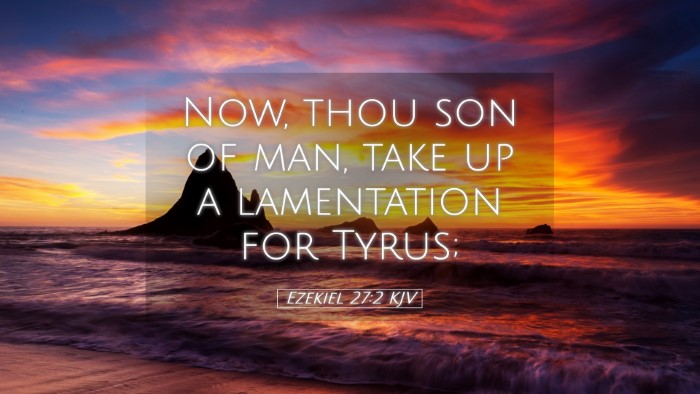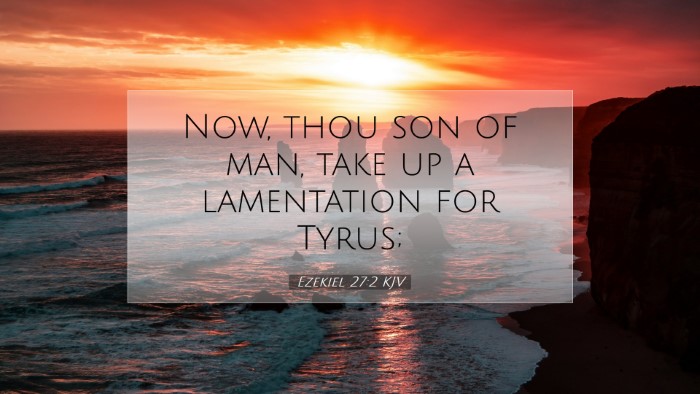Bible Commentary on Ezekiel 27:2
Ezekiel 27:2 reads, "Now, son of man, take up a lament concerning Tyre." This verse serves as an introduction to a lamentation regarding the city of Tyre, a key player in ancient trade and commerce, often symbolizing pride and wealth in the biblical context. This commentary seeks to provide a deeper understanding of the themes and implications of this verse, drawing on insights from various public domain commentaries.
Contextual Background
Tyre was renowned for its wealth and strategic maritime position. It was a significant Phoenician city that dominated Mediterranean trade. The lamentation that God instructs Ezekiel to deliver highlights the city's eventual downfall and serves as both a warning to Israel and a reflection on the transient nature of pride and prosperity.
Insights from Matthew Henry
Recognition of Lament: Matthew Henry emphasizes the solemnity of God’s command to Ezekiel to lament over Tyre. This demonstrates God's concern for nations and cities, indicating that He observes their behaviors and reactions to His will. The lamentation is not merely a criticism but reflects God's expectation of repentance.
The Nature of Tyre's Wealth: Henry notes that Tyre represents the pinnacle of human achievement and commercial success, often marked by a corresponding moral decline. This viewing allows the audience to consider the spiritual implications of material wealth and pride.
Reflections from Albert Barnes
The Role of Tyre: Albert Barnes perceives Tyre as a symbol of the worldly and the corrupt. In his view, the lamentation takes on a prophetic dimension, as it not only addresses Tyre's imminent destruction but also serves as a cautionary tale for others who may emulate Tyre's vanity and self-sufficiency.
Call to Reflection: Barnes prompts readers to reflect on the contrast between Tyre's earthly glory and God's ultimate sovereignty over nations. The strength of Tyre, once a beacon of prosperity, ultimately falls short in the face of divine judgment. This serves as a reminder to believers to place their trust in God rather than in earthly possessions or statuses.
Contributions from Adam Clarke
Importance of the Lament: Adam Clarke highlights the significance of the lamentation. He suggests that it serves to communicate the gravity of Tyre's sins, emphasizing that God is not indifferent to moral decay. Clarke presents this lament as an artistic expression of grief, charged with emotion, and designed to invoke empathy and self-examination in the onlookers.
Understanding Divine Judgment: Clarke also articulates that the impending doom of Tyre illustrates a broader principle of divine judgment. The lamentation illustrates the certainty of God's word and the historical pattern of divine intervention in human affairs. This serves as a poignant reminder that no earthly power can withstand the righteousness of God’s judgment.
Theological Implications
The lament over Tyre invites deep theological reflection on the nature of humanity's relationship with God, particularly concerning pride, prosperity, and judgment. It serves as an admonition to the people of God about the dangers of aligning their hearts toward materialism rather than towards divine truth.
Lessons for Believers
- The Fragility of Human Success: The fate of Tyre illustrates that human achievements are temporary. Believers are encouraged to invest in eternal treasures rather than fleeting successes.
- The Need for Humility: Tyre's pride led to its downfall. This is a clear reminder that humility before God is paramount in sustaining a blessed life.
- The Importance of Prophetic Voices: Ezekiel's role as a prophet reinforces the necessity of prophetic voices within the church today to call out sin and announce God’s judgments and mercies.
- God’s Sovereignty: This passage showcases God’s control over nations, reminding believers that despite appearances, He is aware and in charge of all human affairs.
Conclusion
The lament concerning Tyre in Ezekiel 27:2 is not just a historical narrative; it is a theological statement about pride, judgment, and divine sovereignty. The insights from public domain commentaries by Matthew Henry, Albert Barnes, and Adam Clarke reveal profound lessons on the nature of wealth, human pride, and the character of God. Pastors, students, and theologians are called to engage deeply with this text, allowing its truths to inform their understanding of God’s relationship with nations and His people today.


